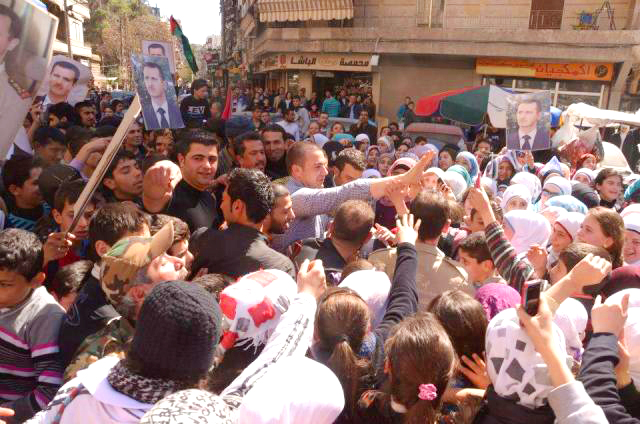SYRIAN army forces have made considerable gains in their battle against foreign-backed militants around the capital, Damascus, retaking a key ‘rebel’-held town.
The government forces regained control of Sbeineh, south of Damascus, and drove out militants from the town last Thursday, Syria state television said.
The broadcaster said: ‘Our brave army has taken control of …the Sbeineh area…and the nearby village of Ghazalah in Damascus province after crushing the last terrorist positions there.’
According to the so-called Syrian ‘Observatory for Human Rights’, Sbeineh was one of the most important positions for the counter revolutionary ‘rebels’ on Damascus’ outskirts, and that ‘rebels’ in the southern part of the capital ‘have now had practically all their supply routes cut off’.
Syrian soldiers also destroyed a major launch-pad used for smuggling weapons and ammunition.
The operation took nine consecutive days, during which a large number of NATO-backed ‘rebels’ were killed.
The takeover came weeks after the recapture of nearby Hussainiyeh, Ziabiyeh and Bweida areas.
Syria has been gripped by deadly unrest since 2011 when NATO-backed ‘rebels’ began their reign of terror.
The Western powers and their regional allies, especially Qatar, Saudi Arabia, and Turkey, are all supporting the ‘rebels’ operating inside Syria.
According to United Nations figures, since the conflict began more than 100,000 people have been killed and millions displaced in the violence instigated by these counter revolutionary Islamists.
On Wednesday, a crucial road linking the central city of Hama with the city of Aleppo in the north was taken back by the Syrian army.
They were then able to send through the first convoy of over 20 trucks carrying fuel supplies to Aleppo.
The route had been closed since August because of heavy fighting between the army and the foreign-sponsored terrorists.
The army took control of the road on Sunday night after engaging in a fierce battle with them.
This came on the heels of several recent advances by the army against the militants in the north.
Since mid 2012, the government forces have been fighting to take control of Aleppo, Syria’s largest city and the country’s former commercial hub.
Meanwhile, France and Saudi Arabia have agreed to give more weapons to the foreign-backed ‘Takfiri’ ‘rebels’ operating in Syria.
French Defence Minister Jean-Yves Le Drian said on Monday: ‘Our approach to the situation is identical.’
He made the comment after holding talks with Saudi officials in the city of Jeddah.
The French defence minister said Paris and Riyadh would support the so-called ‘Syrian National Coalition’ and the terrorist ‘Free Syrian Army’ ‘on the military level, as well as the humanitarian and political levels.’
Meanwhile, weapons inspectors say they have verified one of Syria’s two remaining chemical weapons production sites.
Syria is cooperating with the disarmament operation and has already said it had approximately 1,290 tonnes of chemical weapons and agents as well as 1,230 unfilled chemical munitions, meaning shells, rockets or mortars.
Syria has already destroyed 99 warheads and is expected to destroy 55 more.
Inspectors have already verified 21 out of 23 sites declared by Syria but two sites were too dangerous to reach.
They said the latest site, near Aleppo, was verified using footage from sealed cameras and that it was dismantled and abandoned.
Earlier, a statement released by the Organisation for the Prohibition of Chemical Weapons (OPCW) said photographs and footage provided by Syria ‘showed the building empty near Aleppo’.
The exact location and the time that the images were taken were fully authenticated, the statement said.
‘As per the declaration by Syria, the site was confirmed as dismantled and long abandoned with the building showing extensive battle damage,’ the OPCW said.
Syria has agreed to destroy its stockpile of nerve agents and chemical munitions by mid-2014.
A Syrian delegation is at the OPCW headquarters in The Hague this week to work out where and how to destroy the last of the stockpile.
The deadline to finalise the plan is 15 November.
Syria has proposed destroying its stockpile outside the country because the continuing battle to rid Syria of the NATO-backed ‘rebels’ makes the destruction of chemical weapons within Syria risky.
Earlier in the year, following Tory Prime Minister Cameron’s defeat in parliament over his intention to bomb Syria, President Obama in the US was also facing a defeat in congress over the use of military force against Syria.
It was in this situation, where Obama faced possible impeachment, Russia rushed to the US’s aid and agreed to a joint US-Russian deal to destroy Syria’s chemical weapons and began a disarmament process, leaving Syria open to an imperialist invasion.
Russia and the imperialist nations and their Middle Eastern allies are desperate to fix a date for a ‘peace conference’ on the Syrian conflict.
However, there is a deepening crisis over who will attend and what will be discussed.
The UN-Arab League envoy on Syria, Lakhdar Brahimi, had hoped to hold the conference in Geneva this month.
But earlier this week he said he was not able to announce a date, despite a day of meetings first with senior diplomats from the US and Russia, then with the other permanent members of the UN Security Council, the UK, France and China, as well as Syria’s neighbours Lebanon, Iraq, Jordan and Turkey.
Brahimi said he was still ‘striving’ for a summit by the end of the year.
• Syria’s President Bashar al-Assad on Wednesday compared his country’s war against terrorists to the conflict that devastated Algeria for an entire decade.
‘The Algerian people’s position on the Syrian conflict is not surprising, considering they had to undergo a challenge that was similar to the Syrian people’s, which is currently facing terrorism,’ Assad said during a visit by an Algerian delegation to Damascus.
Algeria has systematically abstained in Arab League votes and stands by the Assad government.
The Algerian civil war in the 1990s killed 200,000 people, according to official figures.
